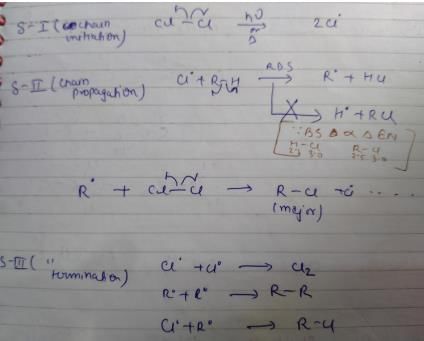Test: Types of Organic Reactions - JEE MCQ
Test Description
10 Questions MCQ Test - Test: Types of Organic Reactions
Test: Types of Organic Reactions for JEE 2025 is part of JEE preparation. The Test: Types of Organic Reactions questions and answers have been prepared
according to the JEE exam syllabus.The Test: Types of Organic Reactions MCQs are made for JEE 2025 Exam.
Find important definitions, questions, notes, meanings, examples, exercises, MCQs and online tests for Test: Types of Organic Reactions below.
Solutions of Test: Types of Organic Reactions questions in English are available as part of our course for JEE & Test: Types of Organic Reactions solutions in
Hindi for JEE course.
Download more important topics, notes, lectures and mock test series for JEE Exam by signing up for free. Attempt Test: Types of Organic Reactions | 10 questions in 15 minutes | Mock test for JEE preparation | Free important questions MCQ to study for JEE Exam | Download free PDF with solutions
Detailed Solution for Test: Types of Organic Reactions - Question 1
Detailed Solution for Test: Types of Organic Reactions - Question 2
Test: Types of Organic Reactions - Question 3
A reagent that brings an electron pair is known as:
Detailed Solution for Test: Types of Organic Reactions - Question 3
Test: Types of Organic Reactions - Question 4
One molecule of water adds to alkynes on warming with mercuric sulphate and dilute sulphuric acid to form:
Detailed Solution for Test: Types of Organic Reactions - Question 4
Test: Types of Organic Reactions - Question 5
Majority of the reactions of alkynes are the examples of:
Detailed Solution for Test: Types of Organic Reactions - Question 5
Detailed Solution for Test: Types of Organic Reactions - Question 6
Test: Types of Organic Reactions - Question 7
Which one of the following is the strongest acid ?
Detailed Solution for Test: Types of Organic Reactions - Question 7
Detailed Solution for Test: Types of Organic Reactions - Question 8
Detailed Solution for Test: Types of Organic Reactions - Question 9
Test: Types of Organic Reactions - Question 10
In Friedel crafts alkylation and acylation the attacking reagent is an:
Detailed Solution for Test: Types of Organic Reactions - Question 10
Information about Test: Types of Organic Reactions Page
In this test you can find the Exam questions for Test: Types of Organic Reactions solved & explained in the simplest way possible.
Besides giving Questions and answers for Test: Types of Organic Reactions, EduRev gives you an ample number of Online tests for practice
Download as PDF
















